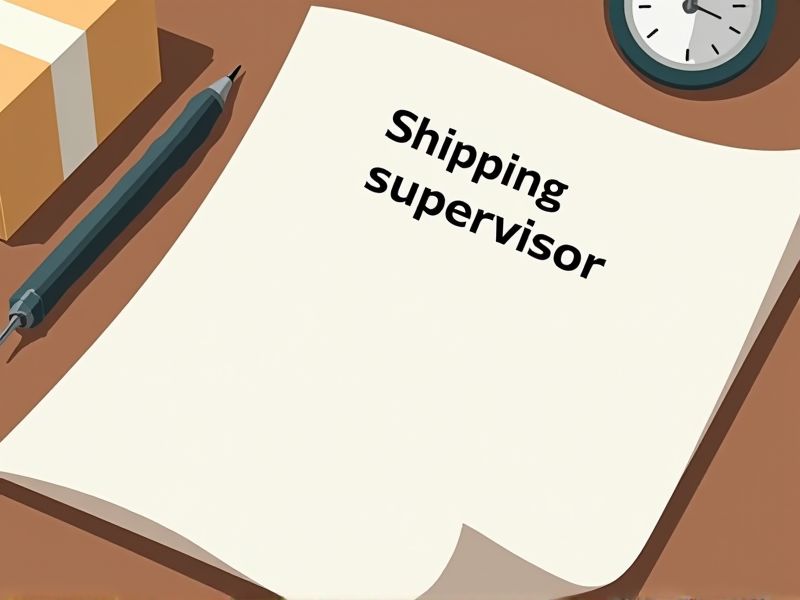
A shipping supervisor's role is crucial in ensuring the seamless flow of goods, demanding a deep understanding of logistics principles and regulations. Certifications provide validation of this expertise, instilling confidence in stakeholders and enhancing procedural efficiency. Furthermore, industry-recognized certifications can influence career advancement by distinguishing candidates in a competitive field. Below are some essential certifications required for a shipping supervisor.
Certified Supply Chain Professional (CSCP)
The CSCP certification enhances a shipping supervisor's understanding of integrated supply chain management, improving decision-making. With a deeper knowledge of logistics and inventory management, supervisors can streamline shipping processes, leading to cost reductions. This certification equips professionals with the ability to align shipping operations with global supply chain strategies, boosting overall efficiency. It enhances problem-solving capabilities, which reduces operational errors and improves customer satisfaction.
Certified in Logistics, Transportation and Distribution (CLTD)
Being certified in Logistics, Transportation, and Distribution (CLTD) helps shipping supervisors stay current with industry best practices and technologies. The certification signals professional credibility and commitment, which can enhance career advancement opportunities. CLTD-trained individuals often demonstrate more efficient problem-solving skills, leading to cost savings and improved operations. Knowledge from the certification improves risk management strategies, reducing potential shipping delays and losses.
International Maritime Dangerous Goods (IMDG) Certification
IMDG Certification ensures a shipping supervisor possesses the necessary knowledge to safely handle and transport hazardous materials, reducing the risk of accidents. This certification aligns with international regulations, facilitating smooth shipping operations across global ports. Without it, non-compliance can lead to legal penalties, delays, and potential harm to personnel and the environment. Businesses with certified supervisors often experience enhanced reputation and trust among clients, boosting competitive advantage.
Hazardous Materials (HazMat) Shipping Certification
Shipping supervisors require HazMat Shipping Certification because it ensures compliance with government regulations, preventing legal consequences and fines. The certification educates supervisors on proper labeling and handling protocols, which reduces the risk of accidents and environmental damage. It provides the necessary knowledge to safely transport hazardous materials, safeguarding the health of workers and the public. Certification also enhances company reputation, as it demonstrates a commitment to safety and regulatory adherence.
OSHA Health and Safety Certification
Shipping supervisors encounter hazardous environments with moving machinery and heavy lifting, which increases the risk of accidents. Obtaining OSHA Health and Safety Certification enables them to recognize potential risks and implement safety protocols, reducing injury incidents. This certification also ensures compliance with federal safety regulations, avoiding legal penalties. Enhanced safety awareness leads to a more efficient workplace, minimizing downtime associated with accidents.
Lean Six Sigma Yellow Belt Certification
Shipping supervisors often encounter process inefficiencies that can lead to delays and cost overruns; Lean Six Sigma Yellow Belt Certification equips them with tools to identify and eliminate waste. The certification fosters a mindset of continuous improvement, critical for optimizing shipping operations. Enhanced problem-solving skills from the certification lead to streamlined workflows and improved team performance. Implementing Lean Six Sigma principles helps ensure customer satisfaction by consistently meeting delivery standards.
Customs Broker License
A Customs Broker License is essential for a Shipping Supervisor to ensure compliance with international trade regulations. It grants the authority to manage and streamline the process of dealing with customs on behalf of the company, minimizing the risk of legal complications. With this license, a supervisor can enhance operational efficiency by correctly classifying merchandise and determining the applicable duties. Expertise in customs brokerage reduces shipment delays, leading to improved customer satisfaction and competitive advantage.
Transportation Worker Identification Credential (TWIC)
The Transportation Worker Identification Credential (TWIC) is essential for a Shipping Supervisor because it ensures secure access to sensitive maritime facilities and vessels, mitigating potential security threats. Federal regulations mandate that individuals requiring unescorted access to secure areas of maritime infrastructure possess a TWIC for compliance and safety. Possessing a TWIC allows the Shipping Supervisor to efficiently oversee and manage operations within these secure zones, ensuring logistics continue without disruption. The credential also functions as evidence of a background check, confirming the suitability of the holder for positions that influence national transportation security.
Certified Professional Logistician (CPL)
A Certified Professional Logistician (CPL) ensures that shipping supervisors possess comprehensive knowledge of logistics systems and supply chain management principles, thereby reducing errors and improving efficiency. Certification demonstrates a recognized standard of expertise, which can build client trust and attract more business for the shipping company. CPL holders are trained to optimize cost-efficiency in shipping operations, leading to increased company profitability. Having a CPL-qualified supervisor can lead to better risk management and compliance with industry regulations, reducing potential legal issues.
Warehouse Management Certification
Warehouse Management Certification enhances a shipping supervisor's understanding of logistics and inventory management, improving operational efficiency. The certification provides validated expertise in state-of-the-art technologies and processes, streamlining the shipping workflow. Possessing this credential can significantly reduce errors and delay in shipping processes, fostering improved customer satisfaction. Companies view certified supervisors as more reliable and skilled, potentially leading to better career advancement opportunities.
Summary
With enhanced certifications, you can expect improved proficiency in logistics management. This leads to more efficient shipping operations and reduced errors. As a certified professional, your decision-making capabilities are likely to enhance, resulting in cost savings for the company. Improved credentials often lead to career advancement opportunities and increased job satisfaction.
